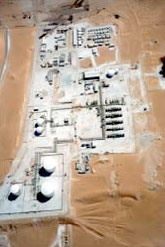Africa
Block 406A, Ghadames Basin Algeria; CEPSA
 International Reservoir Technologies has provided and continues to provide integrated consulting services and ongoing reservoir management support for three volatile oil reservoirs on this block. International Reservoir Technologies performed the well test analyses for the first two wells drilled in the Rhourde el Khrouf Field. Following the second well, the operator (CEPSA) obtained 2,500 km of 2-D seismic data through both proprietary acquisition and data trades. There were five vintages of data in all, and these were converted into a single consistent data set on the workstation by analyzing 480 line tie points and performing a grid balance in time, phase, frequency and amplitude. The RKF structure itself was mapped along with the structure that became the basis for the discovery of the giant Ourhoud Field. International Reservoir Technologies completed a sequence stratigraphic analysis to provide flow unit definition to the reservoir models. Equation-of-state parameters were derived from detailed phase behavior analyses supporting the simulation work. Landmark VIP has been used to model the effects of gas re-injection in these reservoirs. Economic evaluations and studies were then performed to determine project feasibility and unitization among multiple leaseholders in the Ourhoud Field.
International Reservoir Technologies has provided and continues to provide integrated consulting services and ongoing reservoir management support for three volatile oil reservoirs on this block. International Reservoir Technologies performed the well test analyses for the first two wells drilled in the Rhourde el Khrouf Field. Following the second well, the operator (CEPSA) obtained 2,500 km of 2-D seismic data through both proprietary acquisition and data trades. There were five vintages of data in all, and these were converted into a single consistent data set on the workstation by analyzing 480 line tie points and performing a grid balance in time, phase, frequency and amplitude. The RKF structure itself was mapped along with the structure that became the basis for the discovery of the giant Ourhoud Field. International Reservoir Technologies completed a sequence stratigraphic analysis to provide flow unit definition to the reservoir models. Equation-of-state parameters were derived from detailed phase behavior analyses supporting the simulation work. Landmark VIP has been used to model the effects of gas re-injection in these reservoirs. Economic evaluations and studies were then performed to determine project feasibility and unitization among multiple leaseholders in the Ourhoud Field.
International Reservoir Technologies continues to support the engineering activities in Rhourde el Khrouf Field, offering on-site engineering support, training, and continuity for new engineering staff members of the operator (CEPSA). The miscible gas flood at Rhourde el Khrouf has matured and redevelopment planning is underway, involving higher gas injection rates and WAG for mobility control. International Reservoir Technologies is continuing to support this work with advanced engineering and simulation techniques, and training for the next step in RKF field operations life. Most of the support work is being performed on site in Madrid.
Block 405, Ghadames Basin Algeria; Burlington Resources
International Reservoir Technologies provided engineering support assistance in the construction of a simulation model of the MLN Field using Roxar's MORE Compositional Simulation Model (and later Landmark.s VIP Simulation Model). Engineering support also included the design of a study that would satisfy the Algerian Oil and Gas Ministry's requirements to support commerciality. IRT also provided assistance to Burlington with critical presentations before SONATRACH, as well as final ELA document preparation for the Algerian Oil and Gas Ministry. International Reservoir Technologies also supported evaluations of unitization proposals for fields that spanned several exploration blocks, helping to assure the proposed recovery processes were appropriate and benefited the client to the highest degree possible. Most of the support work was performed on site in London.